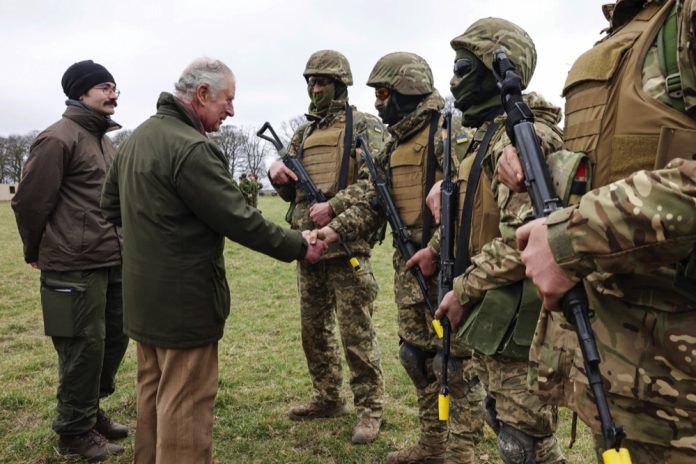
The Duchess of Edinburgh Visiting Ukraine
Monday 29th April
The Duchess of Edinburgh is visiting Ukraine at the request of the Foreign, Commonwealth and Development Office ‘to demonstrate solidarity with the women, men and children impacted by the war and in a continuation of her work to champion survivors of conflict-related sexual violence’.
• The Duchess of Edinburgh is first member of the Royal Family to visit Ukraine since the start of the Russian invasion.
• Her Royal Highness met with survivors of sexual violence, and female IDPs and volunteers who help their communities cope with the trauma of the invasion.
• Two years on from Bucha’s liberation, the Duchess of Edinburgh also paid her respects to those who lost their lives during Russia’s occupation.
Today, [Monday 29th April] the Duchess of Edinburgh became the first member of the Royal Family to visit Ukraine since Russia’s full-scale invasion, to show her solidarity with survivors of conflict-related sexual violence and torture, and as part of her work as a champion of the UK’s Preventing Sexual Violence in Conflict Initiative and the Women, Peace and Security agenda.
While in Ukraine, the Duchess of Edinburgh met with survivors of conflict-related sexual violence and survivors of torture who bravely shared their stories, and with children who have now been safely returned to Ukraine after being forcibly separated from their families and deported by Russia as part of a sustained campaign to erase Ukrainian culture.
Her Royal Highness also met with President Zelensky and First Lady Zelenska to discuss how best to support survivors of conflict-related sexual violence and the women peace-builders who have a vital part to play in ensuring Ukraine’s recovery and reconstruction is effective and long-lasting.
Addressing the CRSV Conference last month, Her Royal Highness said:
“Survivors here and around the world have spoken out so bravely about their experiences.
“They are the most powerful advocates who remind us all that we must not turn our backs on the horrors of this crime, we must never forget survivors.
“Rather, we must stand shoulder to shoulder with all survivors to secure justice and holistic redress, and ensure that this crime isn’t an accepted part of conflict.
“Their rights and their voices must be at the heart of all our efforts to consign conflict-related sexual violence to the history books.”
During the visit, the Duchess of Edinburgh paid her respects to those who lost their lives in Bucha, two years on from its liberation from Russian forces, and visited the ‘Road to Life’, a bridge that became a key part of the Ukrainian resistance when it was blown up to stop Russian troops proceeding to Kyiv, and later became a vital route for people to flee to safety from the Russian occupation.
Her Royal Highness also demonstrated her support for Ukrainian women who have played important roles in the conflict and community recovery, in a meeting with female volunteers who help their communities cope with the aftermath of the attacks with mental health care activities for children.
Since 2022, the UK has pledged over £4.7 billion in non-military support to Ukraine. This includes over £660 million of bilateral assistance that prioritises the needs of women and girls, for example by funding vital services for survivors of gender-based violence, as well as working with the Office of the Prosecutor General to put survivors at the centre of approaches to prosecuting conflict-related sexual violence crimes.
The UK is working with international partners to hold those responsible for atrocities to account. In addition to providing financial and technical assistance to the International Criminal Court, we have deployed specialist UK war crimes and conflict-related sexual violence experts to the region, and created an expert Atrocity Crimes Advisory Group with the EU and US.
The Duchess of Edinburgh, then Countess of Wessex, announced her commitment to champion the UK’s Preventing Sexual Violence in Conflict Initiative and the UN’s Women, Peace and Security Agenda on International Women’s Day 2019.
Her Royal Highness has visited a number of countries over the years to highlight the impact of historical and ongoing conflict, including Kosovo, Sierra Leone, South Sudan, the Democratic Republic of the Congo and Colombia, and has heard first hand testimonies from survivors of conflict related sexual violence.
The Preventing Sexual Violence in Conflict Initiative (PSVI) and the Women, Peace and Security agenda are a key focus for the UK Government. We are committed to tackling conflict related sexual violence globally, and supporting women’s participation in conflict prevention, relief and recovery.
Last month, the UK announced its allocation of £1.5 million to International Planned Parenthood Foundation to provide sexual and reproductive health services for the most vulnerable women and girls in Ukraine. These services have helped protect the most at risk by ensuring they have access to vital sexual and reproductive healthcare, including mobile clinics and access to family planning support. This funding has supported over 20,000 people to access vital medical care since July 2022 and provided sexual health information to over 100,000 people.
Through our Preventing Sexual Violence in Conflict programmes and dedicated funding totalling £60 million since 2012, we are leading work internationally to prevent conflict-related sexual violence and strengthen justice and support for all survivors. For example:
The UK has an established Team of Experts in preventing sexual violence in conflict, which has been deployed over 90 times since it was set up, including in Bangladesh, Ethiopia, and in Ukraine.
Last year, the FCDO established the International Alliance on Preventing Sexual Violence in Conflict to drive action with member states. Ukraine is a member of the Alliance.
We have also committed over £7m to the Global Survivors Fund to provide psychosocial, educational and livelihoods support to survivors of conflict-related sexual violence, including in DRC and Iraq.
In Bosnia and Herzegovina and in Kosovo our programmes have contributed to vital legislative changes, and in Colombia, the opening of a judicial macro case on sexual violence crimes.









